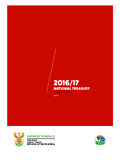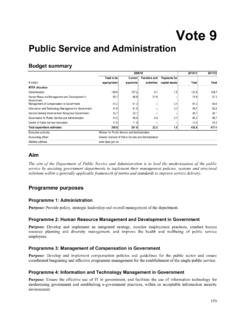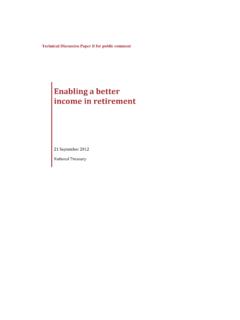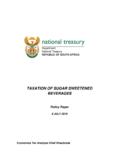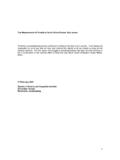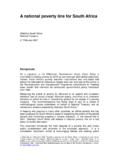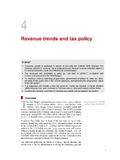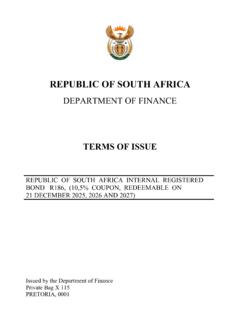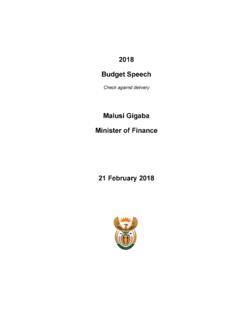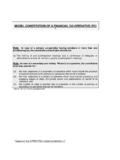Transcription of Supply Chain Management Framework Gazette 25767 dated …
1 NATIONAL TREASURY Republic of South Africa December 2003 regulations IN TERMS OF THE public finance Management ACT, 1999: Framework FOR Supply Chain Management AS PUBLISHED IN Gazette NO. 25767 dated 5 DECEMBER 2003 The Minister of finance has, in terms of Section 76 (4) (c) of the public finance Management Act, 1999 (Act No. 1 of 1999 as amended by Act 29 of 1999) approved the regulations in respect of the Framework for Supply Chain Management as set out in the Schedule. regulations IN TERMS OF THE public finance Management ACT, 1999: Framework FOR Supply Chain Management Definitions 1.
2 In these regulations , unless the context otherwise indicates, a word or expression to which a meaning has been assigned in the public finance Management Act, 1999, has the same meaning as in that Act. Application 2. This Framework applies to all (a) national and provincial departments and trading entities (b) constitutional institutions; and (c) public entities listed in Schedules 3A and 3C to the public finance Management Act, 1999 (Act No. 1 of 1999). Supply Chain Management system 3. (1) The accounting officer or accounting authority of an institution to which these regulations apply must develop and implement in that institution an effective and efficient Supply Chain Management system for (a) the acquisition of goods and services; and (b) the disposal and letting of state assets, including the disposal of goods no longer required.
3 (2) A Supply Chain Management system referred to in subregulation (1) must (a) be fair, equitable, transparent, competitive and cost effective; (b) be consistent with the Preferential Procurement Policy Framework Act, 2000 (Act No. 5 of 2000); and (c) provide for at least the following: (i) demand Management ; (ii) acquisition Management ; (iii) logistics Management ; (iv) disposal Management ; (v) risk Management ; and (vi) regular assessment of Supply Chain performance. Establishment of Supply Chain Management units 4. (1) The accounting officer or accounting authority of an institution to which these regulations apply must establish a separate Supply Chain Management unit within the office of that institution s chief financial officer, to implement the institution s Supply Chain Management system.
4 (2) An official in the Supply Chain Management unit who becomes aware of a breach of or failure to comply with any aspect of the Supply Chain Management system must immediately report the breach or failure to the accounting officer or accounting authority, in writing. Training of Supply Chain Management officials 5. The accounting officer or accounting authority of an institution to which these regulations apply must ensure that officials implementing the institution s Supply Chain Management system are trained and deployed in accordance with the requirements of the Framework for Minimum Training and Deployment issued by the National Treasury.
5 Procurement of goods and services 6. (1) Procurement of goods and services, either by way of quotations or through a bidding process, must be within the threshold values as determined by the National Treasury from time to time. (2) A Supply Chain Management system must, in the case of procurement through a bidding process, provide for (a) the adjudication of bids through a bid committee; (b) for the establishment, composition and functioning of bid committees; (c) the selection of bid committee members; (d) bidding procedures; and (e) the approval of bid committee recommendations. (3) The accounting officer or accounting authority must ensure that (a) bid documentation and the general conditions of a contract are in accordance with (i) the instructions of the National Treasury; or (ii) the prescripts of the Construction Industry Development Board, in the case of a bid relating to the construction industry; (b) bid documentation include evaluation and adjudication criteria, including the criteria prescribed in terms of the Preferential Procurement Policy Framework Act, 2000 (Act No.)
6 5 of 2000); (c) bids are advertised in at least the Government Tender Bulletin for at least 30 days before closure, except in urgent cases when bids may be advertised for such shorter period as the accounting officer or accounting authority may determine; (d) awards are published in the Government Tender Bulletin and other media by means of which the bids were advertised; (e) contracts relating to information technology are prepared in accordance with the State Information Technology Act, 1998 (Act No. 88 of 1998), and any regulations made in terms of that Act; (f) Treasury Regulation 16 is complied with when goods or services are procured through public private partnerships or as part of a public private partnership; and (g) instructions issued by the National Treasury in respect of the appointment of consultants are complied with.
7 (4) If in a specific case it is impractical to invite competitive bids, the accounting officer or accounting authority may procure the required goods or services by other means, provided that the reasons for deviating from inviting competitive bids must be recorded and approved by the accounting officer or accounting authority. Disposal and letting of state assets 7. The accounting officer or accounting authority of an institution to which these regulations apply must (a) in relation to the sale or other disposal of state assets, ensure that (i) immovable property is sold at market related prices, unless the relevant treasury determines otherwise; (ii) movable assets are sold either by way of tender process, auction or at market related prices, whichever is the most advantageous to the state.
8 (iii) in the case of the disposal of computer equipment, the relevant department of education must first be approached to indicate whether any educational institutions are interested in the equipment, and, if so, to arrange for the transport of such equipment at its own cost to any such interested educational institutions; (iv) in the case of the disposal of firearms, the National Conventional Arms Control Committee approves of any sale or donation of firearms to any person or institution within or outside the Republic; and (b) in relation to the letting of state assets (i) ensure that all immovable property, excluding state housing for state officials and political office bearers, is let at market related rates, unless the relevant treasury determines otherwise or approves the letting of property free of charge; and (ii) annually review all fees, charges, rates, tariffs, scales of fees or other charges relating to the letting of state property.
9 All role players to comply to ethical standards 8. (1) All officials and other role players in a Supply Chain Management system must comply with the highest ethical standards in order to promote (a) mutual trust and respect; and (b) an environment where business can be conducted with integrity and in a fair and reasonable manner. (2) The National Treasury s Code of Conduct for Supply Chain Management Practitioners must be adhered to by all officials and other role players involved in Supply Chain Management . (3) A Supply Chain Management official or other role player (a) must recognise and disclose any conflict of interest that may arise; (b) must treat all suppliers and potential suppliers equitably; (c) may not use their position for private gain or to improperly benefit another person; (d) must ensure that they do not compromise the credibility or integrity of the Supply Chain Management system through the acceptance of gifts or hospitality or any other act; (e) must be scrupulous in their use of public property.
10 And (f) must assist accounting officers or accounting authorities in combating corruption and fraud in the Supply Chain Management system. (4) If a Supply Chain Management official or other role player, or any close family member, partner or associate of such official or other role player, has any private or business interest in any contract to be awarded, that official or other role player must (a) disclose that interest; and (b) withdraw from participating in any manner whatsoever in the process relating to that contract. Avoiding abuse of Supply Chain Management system 9. (1) The accounting officer or accounting authority of an institution to which these regulations apply must (a) take all reasonable steps to prevent abuse of the Supply Chain Management system; (b) investigate any allegations against an official or other role player of corruption, improper conduct or failure to comply with the Supply Chain Management system, and when justified (i) take steps against s
